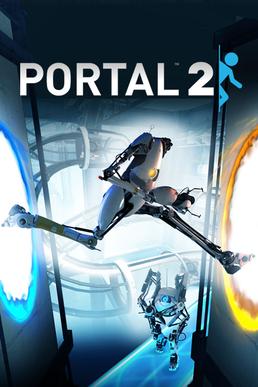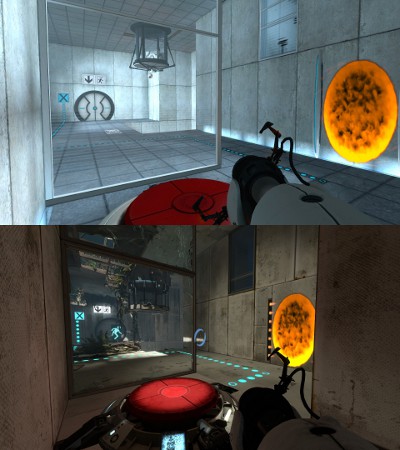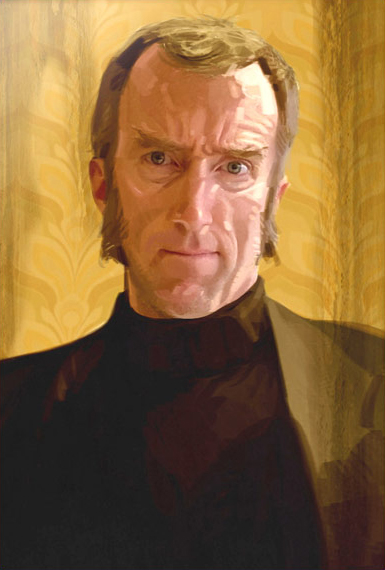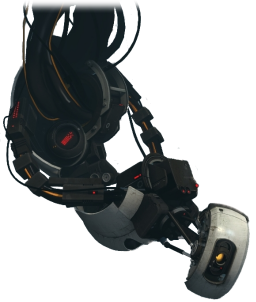It's empathetic. It's not big, but it is clever, and it is funny. It's Portal 2.
Let's backtrack. Portal was a short, experimental game, published by Valve in The Orange Box in 2007, as part of a compilation. Alongside Team Fortress 2, one of the most highly-anticipated multiplayer games of all time, and Half-Life 2: Episode 2, a further installment in Valve's most successful and iconic series, Portal was a game deemed to be in need of a safety net.
And let's be honest, it probably needed it. The independent game development scene of 2007 was not as well defined or as obviously-potent as it is now, with the subsequent breakaway successes of World of Goo, the Humble Indie Bundles, and Minecraft. And Portal was an experimental project of the sort only elsewhere found in the indie scene, being published by a major developer. Portal was a short (3 1/2 hour) game, in which the only gun available shot doors rather than bullets; you were the only human character present; and your only interpersonal interactions were with an AI voiceover, and a glorified crate. It was a puzzle game that turned up, made you think, made you laugh, and then signed off with a song before it had outstayed its welcome.
And it worked. It deconstructed tutorials by making the whole game a steady progression of learning, introducing new ideas at a natural pace, before deconstructing the world it had constructed, taking you behind the scenes of the puzzles through new puzzles, testing and pushing you to use the tools it had given you in new and imaginative ways. The script, with its mocking sense of humour, gave a great deal of warmth to what is, in some ways, a rather lonely, cold environment. Portal was a runaway success.
Portal 2 therefore, offers a game that, at twice the length of the original (between 7-8 hours in single player) could suffer from repetition. Indeed, the same format to the game seen in the first Portal is copied very similarly here - a lift takes you into a test chamber, where you are greeted by a comment in voiceover that is often quite funny. You have a puzzle to solve, and you work out how to do that. A final humorous comment is made in voiceover, and you get into the lift to take you to the next puzzle. Even when breaking this formula apart, this pattern does follow throughout the game.
It is possible to nit-pick too, about the fact that the puzzles (which from later in the game include three types of gel that alter the physics of a situation) can feel, by limiting the surfaces for portals to be used on, to have one set solution. This makes the challenge one of figuring out the correct answer the designers have laid out for you, rather than feeling like you've arrived at your own unique solution by improvisation.
But, actually, all that nit-picking misses the point entirely.
Portal 2 is a deeply empathetic game, and it's triumph is not in making you feel clever, but in making you care. Honestly, if you just want to feel clever, go play SpaceChem. Seriously, you can buy it right here, and it only costs £8.99. You'll love it. Portal 2 can gives you that feeling, but the puzzles never reach the level of challenge that warrant you patting yourself on the back too much, despite the odd euphoric eureka moment. Again, that's not the main point.
Portal 2 lays out Aperture Science as a ruin from the start of the game, a ruin that you, as Chell (the protagonist from the original Portal) created through the destruction of GLaDOS, the rogue AI in charge of the facility. Your guide is Wheatley, a robot in the shape of a single eye, voiced by Stephen Merchant. Merchant is excellent, and very funny, reading his lines with the same casual naturalness that he brings to Extras. The offputting aspect, particularly for British gamers, is that he is Stephen Merchant, and never stops sounding like him, so if you don't find him funny as Stephen Merchant, you won't find him funny as Wheatley.
But Wheatley, and GLaDOS for that matter, are incredible creations, Pixar-eque in their expressiveness, and expertly voiced (Ellen McLain as GLaDOS is pushed further here, and voices the role magnificently), they create characters who emote in complex ways, and lend themselves to some blackly amusing lines as well as being occasionally deeply sympathetic. J.K. Simmons appears in voice recordings as Cave Johnson, the creator of Aperture Science, and provides a great deal of texture to the backstory of Portal, giving some of the funniest lines in the process.
Portal 2's middle Act tells the story of the rise and fall of Aperture, sending you through the remnants of Aperture as it was at the start, and then at three further periods of time prior to that seen in Portal. Walking through the deserted time capsules of Aperture is strangely affecting, and eerily melancholic, as the creative, mad, dream of Cave Johnson slowly changes form around him.
Ultimately, the narrative of Portal 2 is about the attempts of three individuals to shape the world around them: Cave Johnson, GLaDOS, and Wheatley. Chell, the protagonist, is trapped within the worlds created by each of them, playing along before tearing down the systems that they create. At an empathic step further than any other game playing with this set up, Portal 2 understands that the people who try to shape the world around them are driven, often in bizarre, somewhat tragic ways, and that there is a comedic pathos in their Cnut-like failure to force the world to play by their rules.
Portal 2 is a warm-hearted game, with no aversion to the odd melancholic bent, but it is one that is profoundly joyous to play. It delights in itself, whether that be its fiction, its own jokes, or its puzzles. It laughs with you, infectiously, in a manner that is very hard not to warm to. While the humour may be less black than the first game, and is at turns broader, sillier, and occasionally self-referential, it is always inclusive in its tone, and is balanced by moments of spiky aggression. The script constantly surprises. It makes virtues from the fact that there are no other humans present by keeping the one that is present a blank slate, and making the artificial intelligences warm, emotional, and funny. It makes a virtue too of its almost entirely non-violent nature, and has a magnificent twist ending that, which while predictably closing with a song, plays with the rules of the game and player expectation in an entirely unexpected way.
A short co-op campaign (two to three hours) adds yet another dimension to the experience, with a separate story that follows from the single player, retooling the game into puzzles designed for two. Make sure you play with someone you know though, because you'll only get to experience them for the first time once, and you want the person you play with to not ruin the experience for you.
Portal 2 is one of the funniest, best-written, cleverest, and warmest entertainments you can find in any medium right now. If you haven't yet, play it. And certainly, if you haven't played the first yet, you deserve to. Jointly they prove why gaming is exciting, and why it is a joyful medium to be exploring right now.










No comments:
Post a Comment